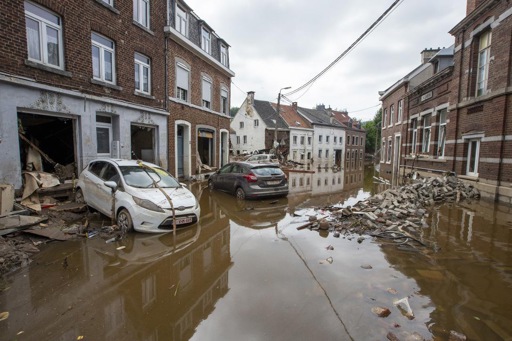There is a crying need for a risk culture among Belgium's population to better prepare citizens for potential disasters, according to a study on the July 2021 floods, commissioned by the federal government and due to be presented on Tuesday in the House Interior Committee.
The floods, which mainly affected Wallonia, killed 39 people, made thousands more victims and destroyed billions of euros' worth of infrastructure.
The study aimed to provide a clear picture of the entire disaster, evaluate its management and draw lessons for the future. It was conducted by the Brussels Information, Documentation and Research Center (BRIO) and the Université Libre de Bruxelles (ULB)’s Policy Lab.
The researchers focused mainly on the role of the population during the course of the crisis. Their recurring findings included the difficulty in deciding on evacuation orders and convincing the population to effectively evacuate.
Population poorly prepared for emergencies
“The population is very poorly prepared for an emergency and, more generally, for the culture of risk,” the study concluded. “In most cases, residents of the affected areas decided to leave only when the rising waters became visible in their immediate surroundings," it noted. "Many were stuck in their homes and had to wait many hours for help.”
Aid workers had difficulty convincing people to leave their homes during the disaster and during the rescue operations," the researchers added. "Of those surveyed for the study, only 24.7% had wanted to leave their homes during the floods, while two-thirds say they had not been warned."
Those who did receive a message mainly heard that they should not do anything except move their vehicles or possibly go to the second floor.
The government's risk assessment is also addressed in the study. For example, Royal Meteorological Institute (IRM) alarm signals are not linked to explicit risks, so “it (was) impossible to predict how high the water would rise, how fast and with what flow rate,” the experts pointed out.
Information flow impeded by division of powers between government and regions
In turn, the flow of information was complicated by the division of powers between the federal government, which is responsible for the IRM, and the regions, which oversee the waterways.
“Each entity takes its share of information (warnings or situation of the waterways), but this data is not compared and provided to the services or the municipal authorities so that they can take adequate preparation measures," the study notes.
There were also coordination problems during the disaster. Because the flood was initially considered a fairly common one, several municipalities implemented their own disaster plans. However, many town halls, service centers and barracks themselves were flooded, so coordination went completely haywire. At the provincial level, in turn, there was no way to oversee the entire situation.
Therefore, it is not only at the population level that a risk culture needs to be implemented. Several municipalities do not appear to have a General Emergency and Intervention Plan while others need to update theirs, the experts recommended.

